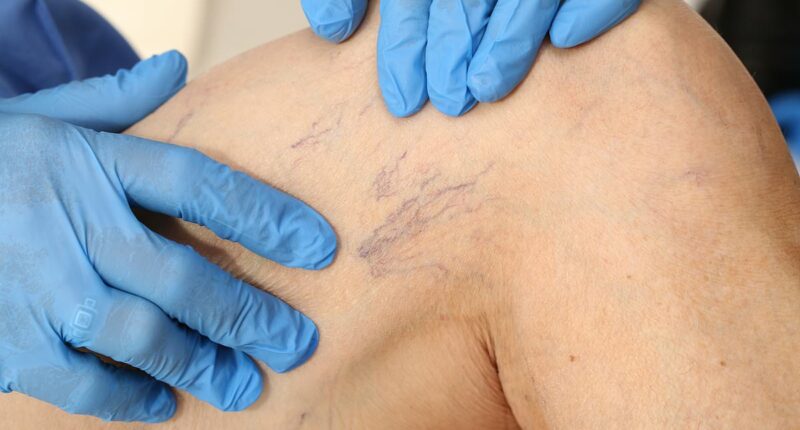Share this @internewscast.com
I have started to get thread veins on my legs and ankles. I hate how they look. Is there anything I can do to get rid of them?
Dr Ellie Cannon replies: Thread veins are not usually treated on the NHS as they are considered a cosmetic issue – but that doesn’t mean there’s nothing to be done.
Also known as spider veins, these are small blood vessels that appear on the skin and often look like webs or branches.
They can be triggered by ageing, hormonal changes such as pregnancy or the menopause, sun exposure, and prolonged periods of sitting or standing.
However, thread veins rarely cause symptoms and do not affect blood supply.
Some go private – a treatment called sclerotherapy involves injecting the area with a solution to shut down the veins.
Laser therapy can work on very small thread veins but can also darken or lighten the skin.
A new treatment – diathermy – involves heating the veins with an electric current. This appears to be more effective than sclerotherapy and laser therapy.

Also known as spider veins, thread veins are small blood vessels that appear on the skin and often look like webs or branches
Sessions take less than an hour and require no injections. However, patients often need repeated sessions.
Avoid crossing legs but try compression socks – which can be bought from a pharmacist – as they appear to help prevent thread veins from worsening.
Patients should have thread veins inspected by a GP before any private treatment. This is because they can be triggered by varicose veins – swollen or twisted blood vessels – which are themselves caused by a fault in the valve that controls blood flow.
If this underlying issue is not treated, then, even after private treatment, the thread veins will continue to come back.
I’m 57 and I have had a wheeze for four years now. It stops me from doing physical activity. But my doctor claims it’s not asthma and has suggested it is anxiety. I think he is wrong. What should I do?
Having a wheeze is not always a sign of asthma. Asthma occurs when the airways narrow and swell. One symptom is wheezing, but this is usually accompanied by coughing, shortness of breath and a tightness of chest.
GPs will usually check for asthma using a FeNO test. This test looks for signs of a gas called nitric oxide in the breath or blood, which suggests inflammation in the airways.
If this is negative, patients might then be offered another test called spirometry – which measures how much air patients can exhale, to give a sense of whether the lungs are functioning properly.
Any patient with asthma symptoms who has not had either of these tests should request one from their GP.
There are lots of other conditions that mimic asthma and this does include anxiety.
People with severe anxiety can sometimes experience rapid, shallow breathing, known as hyperventilation. If this is the cause, talking therapy or antidepressants might help to calm the symptoms.
However, there are a number of other conditions that trigger these asthma-like symptoms too. Bronchiectasis and COPD are two lung diseases that trigger wheezing, though they tend to also cause other symptoms like a cough. A post-nasal drip, where excess mucus in the nose drips into the throat, inflaming it, can trigger wheezing.
In some cases, so too can certain heart conditions, such as heart failure. For this reason, anyone with undiagnosed wheezing might benefit from a heart check.
Dysfunctional breathing disorder can also lead to wheezing. Respiratory physiotherapists can help these patients retrain their breathing, reducing symptoms.
I’m 88 and was recently diagnosed with an particularly severe abdominal aortic aneurysm. I’ve had two scans in the past year but have not been informed of the results. How can I get my results back?
No patient should be made to wait an unnecessarily long time for medical results – particularly those later in life.
In this situation, I would advise patients to ask their GP for help. Although it’s not strictly their job, GPs will often be able to find out what is holding up the results.
If a GP cannot help, it might be worth contacting the Patient Advice and Liaison Service, also known as PALS.
Their job is to help patients get the care they need from the hospital. PALS can also – if necessary – assist in filing a complaint about care. An abdominal aortic aneurysm or AAA is a condition whereby the largest blood vessel in the body, the abdominal aorta, develops a swelling or a bulge.
A burst in this vessel is a life-threatening complication. Patients with a severe AAA should be scanned every three months. And, when the aneurysm reaches a certain size, patients should be eligible for an op to repair the bulge.
This procedure can be minimally invasive.
Don’t let wellness spas trick you
A patient recently told me he’d been suffering persistent headaches – but reassured me he’d had tests at ‘a private clinic’ that showed it was nothing serious.
Curious, I looked it up. To my horror, it turned out to be one of those High Street spas that offers vitamin drips and vampire facials. And now, it seems, they’re also offering to diagnose illnesses – or worse, give people the all-clear.
This worries me deeply. Persistent headaches can sometimes be a sign of something serious. But the tests in these kinds of places aren’t clinically valid. My patient believed he’d had a proper medical assessment. It was a wake-up call.
Do customers of these commercial wellness outlets realise what they’re getting isn’t proper medicine?
Have you ever had health testing like this – or been falsely reassured by results from a High Street clinic?
Would you choose to have a mastectomy?

Currently, preventative mastectomies are offered only to women who carry a faulty gene such as BRCA, who have a 50 to 80 per cent chance of developing breast cancer (picture posed by model)
As someone with a family history of breast cancer, I was interested in research published this week about reducing risk of the disease. I have yearly mammograms in the hope of picking anything up early enough to treat but other options include surgery or medication.
Currently, preventative mastectomies are offered only to women who carry a faulty gene such as BRCA, who have a 50 to 80 per cent chance of developing breast cancer.
But modelling from Queen Mary University suggests any woman with a risk above 35 per cent should be offered the op – possibly preventing 6,500 cases a year in the UK.
I don’t think I’d opt into it any time soon but it’s more evidence of how far medicine has evolved around this once-deadly cancer. Would you have a mastectomy to prevent cancer? Or have you had one… and regret it?












